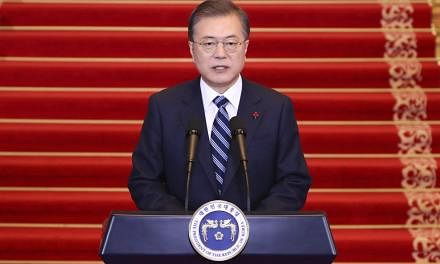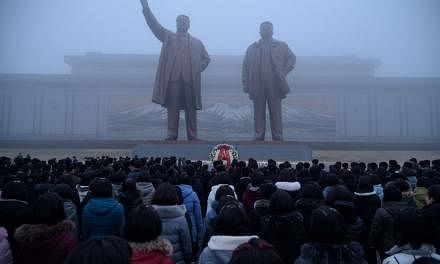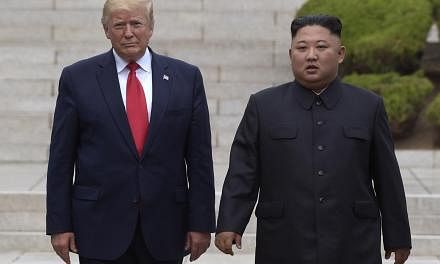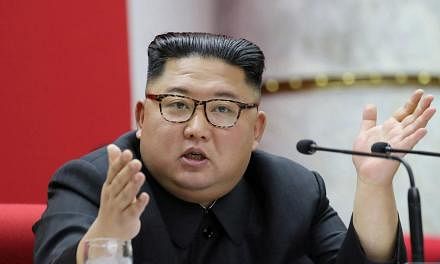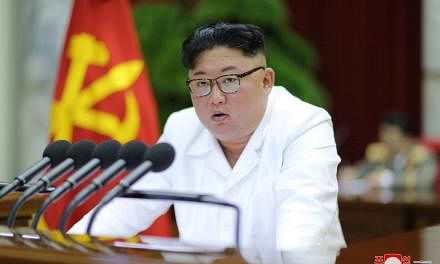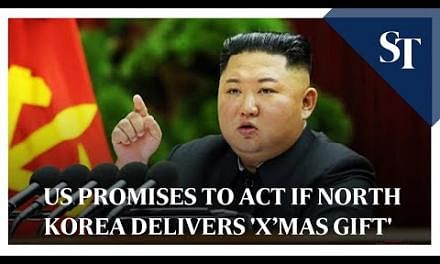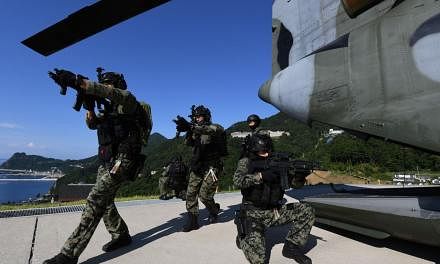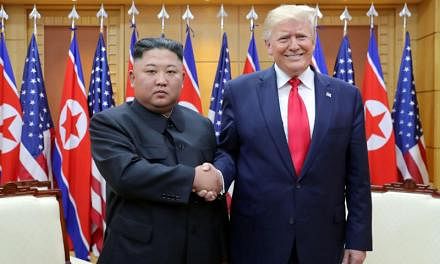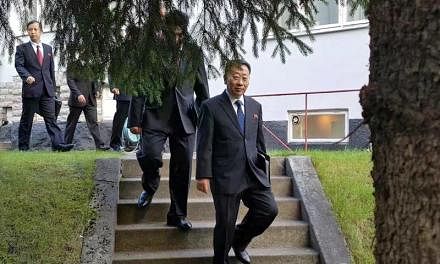TOKYO - Japan has strong hopes that the historic Trump-Kim summit in Singapore will mark a big step towards peace and stability in North-east Asia, Chief Cabinet Secretary Yoshihide Suga said on Tuesday (June 12).
He told reporters at a news conference after the Cabinet meeting that Japan and the United States were closely aligned on their policies towards North Korea.
Japanese Foreign Minister Taro Kono also told reporters on Tuesday that he will make a two-day visit to Seoul from Wednesday, for two-way and three-way talks with US Secretary of State Mike Pompeo and South Korean counterpart Kang Kyung Wha.
All domestic news channels on Tuesday - including public broadcaster NHK, as well as TV Asahi and TBS - featured rolling coverage of the summit, cutting to a live broadcast at about 9am (8am in Singapore) as the convoys of US President Donald Trump and North Korean leader Kim Jong Un departed their respective hotels for the summit venue, the Capella Singapore hotel on Sentosa island.
Live footage of the historic handshake between the two leaders - and their initial remarks as they sat down for talks - was also beamed across television screens in Japan.
"It looks like the summit meeting is half-way to success and I hope that by the end of the talks, we can rejoice over the outcomes," Mr Toshihiro Nikai, secretary-general of Japan's ruling Liberal Democratic Party (LDP), said.
"To be in a situation where the two countries can have dialogue and talk directly to each other will be a great relief to all, and we should all make efforts so that such circumstances can persist for a long time to come."
Japanese Prime Minister Shinzo Abe spoke to President Trump for half an hour by phone on Monday, four days after they met for their seventh bilateral summit at the White House during which North Korea had dominated the agenda.
Both times, he won reassurances from Mr Trump that he would "100 per cent" raise the longstanding abduction issue at his meeting with Mr Kim.
This abduction issue refers to the North's kidnapping of Japanese citizens in the 1970s and 1980s. It is a highly emotive issue in Japan, which says 12 citizens remain unaccounted for. But North Korea asserts that the issue is fully resolved, in claiming that eight have died while the other four never entered the country.
Mr Suga said on Tuesday: "We strongly hope that the summit today will be a chance for progress on the nuclear and ballistic missile issues and, most importantly for Japan, the abduction issue."
Japanese Defence Minister Itsunori Onodera told reporters before the summit that he was hopeful for success.
But even so, he sounded a note of wariness: "Given the past cases of North Korea, even if certain promises are made at the US-North Korea summit talks, we should not ease our resolve until we can verify that concrete action has been done."
Mr Kono, separately, told reporters that the focus of Tuesday's summit will be on how big a commitment North Korea will make towards the complete, verifiable and irreversible dismantlement (CVID) of their nuclear weapons and ballistic missile arsenal, of all ranges.
He added that while Japan has asked Mr Trump to raise the abduction issue at his talks with Mr Kim, Tokyo believes that it is "ultimately a matter that we need to discuss directly with North Korea".
Mr Abe, speaking at the White House last Thursday, had said that he wanted to hold a summit meeting with Mr Kim - whose official title is Chairman of the State Affairs Commission.
"There can be no doubt that the effects of North Korea taking steps down the path towards peace, the rule of law and stability will transcend Asia and extend to the global economy as a whole," he said, vowing again to normalise ties and provide economic aid to North Korea once all the issues are comprehensively resolved.
He said that the Asia-Pacific region stands to benefit greatly from any opening up of the North Korean economy, given its "untouched resources as well as an abundant labour force".


